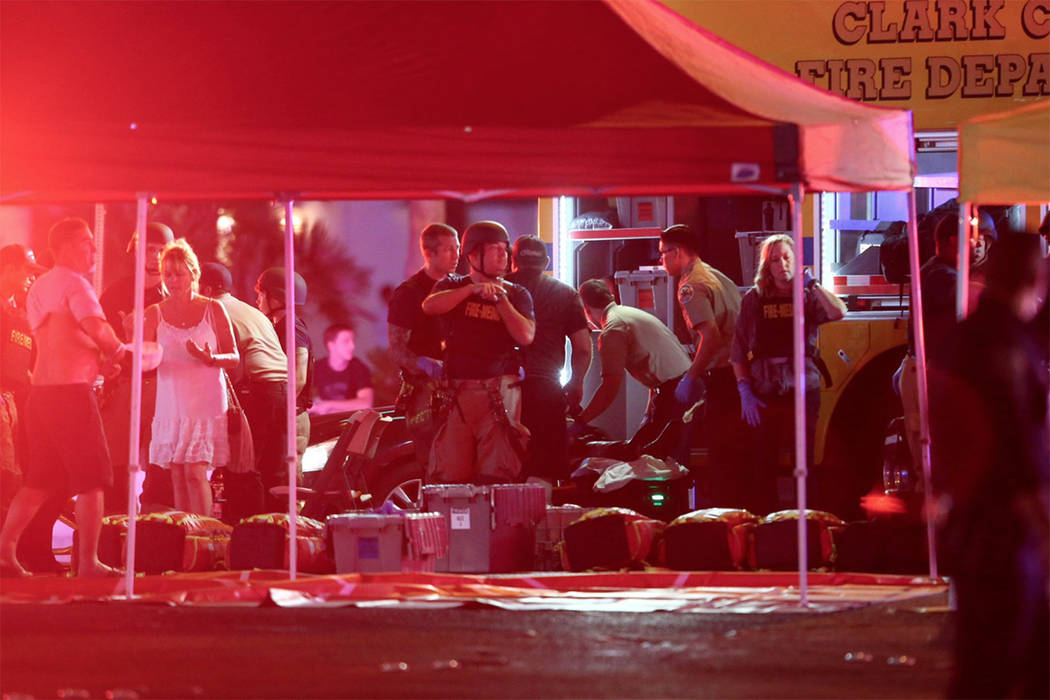During Las Vegas shooting, journalists ran into gut-wrenching chaos

It’s been almost two weeks since the “Las Vegas shooting.” It still doesn’t feel real.
Apparently that’s normal, I learned this week, from a therapist I interviewed who specializes in trauma. She’s one of several people my co-workers and I have written about — the survivors, the heroes, the dead.
After tragedy, the pivot is torturous: Returning to work. Flying or driving back home. Lying in bed while the rest of the world moves on.
It’s easy to forget journalists are humans. As we scribble in our notebooks and click our cameras, we soak up the stories around us. Our job is to present those stories to the public, but we carry them with us, too.
Here are a few dispatches from Oct. 1, which we’re all just beginning to revisit:
Max Michor, our overnight cops reporter, had been awake for only about 10 minutes when he got a call about the 10:05 p.m. shooting.
“I didn’t think it was that big of a deal because when people report hearing gunshots on the Strip, it almost never ends up being true,” he said.
But as he pulled up to the scene, it became clear this was no false alarm.
“I got out of my car and saw people running away,” he said. “That was the first time I cried that night.”
Running toward the Strip, he called his mom.
“I told her that I didn’t know what was happening,” he said, “but that I’d heard on the scanner that 20 people were dead.”
Rio Lacanlale, another cops reporter, happened to be listening to the scanners at home. She was standing in her kitchen, putting popcorn in the microwave, when she heard a panicked officer over the radio.
“When I realized it wasn’t a training exercise, I ran upstairs and changed, threw my laptop in my bag and got in my car,” she said.
Interstate 15 was a parking lot. First responders whizzed by on the shoulder. When she finally made it to the scene, she wished she hadn’t.
“I’ve heard some reporters talking about how some journalists wait their entire careers for a story ‘this big,’ but I hope I never see anything like this again,” she said. “I saw bloodied and bruised concertgoers walk past me. The piercing sound of this woman’s sobs as someone carried her down Las Vegas Boulevard will never leave me. A reporter approached her, and she yelled that she’d just seen a man take a bullet to his head. His blood was all over her ripped shirt.”
Blake Apgar, another cops reporter, got there so early police hadn’t all arrived yet. At one point, he was shuffled into Mandalay Bay.
“The lights were still on. The slot machines were still flashing and blinking, but the casino was still,” he said. “It was empty. I saw officers with rifles standing guard.”
Chase Stevens, one of our photographers, had just gotten home after covering the Golden Knights game. He quickly drove back to the Strip and happened upon a makeshift triage area where victims were being carried “by wheelbarrow, by hotel luggage cart, by sliding office chair and by the hands and arms of civilians and first responders.”
“It was surreal,” he said. “But I knew I had to keep doing my job, too, so I continued to photograph and document the scene.”
Mike Shoro, another cops reporter, worked through the night. He ended his shift at one of the valley’s several blood banks just before daybreak.
“Don’t ever let anybody tell you the people of Las Vegas don’t feel a connection to their city,” he said.
As he waited for a ride home, the sun rose, illuminating all the hopeful donors still lined up out the door in the cold wind. He said it was “one of those moments your brain never lets you forget.”
“Yet it was bittersweet,” he said. “I couldn’t help but wonder how many people would wake up with the sunrise to learn a loved one didn’t make it out of the festival.”
Vegas Vice runs every other Saturday. Contact Rachel Crosby at rcrosby@reviewjournal.com or 702-380-8135. Follow @rachelacrosby.